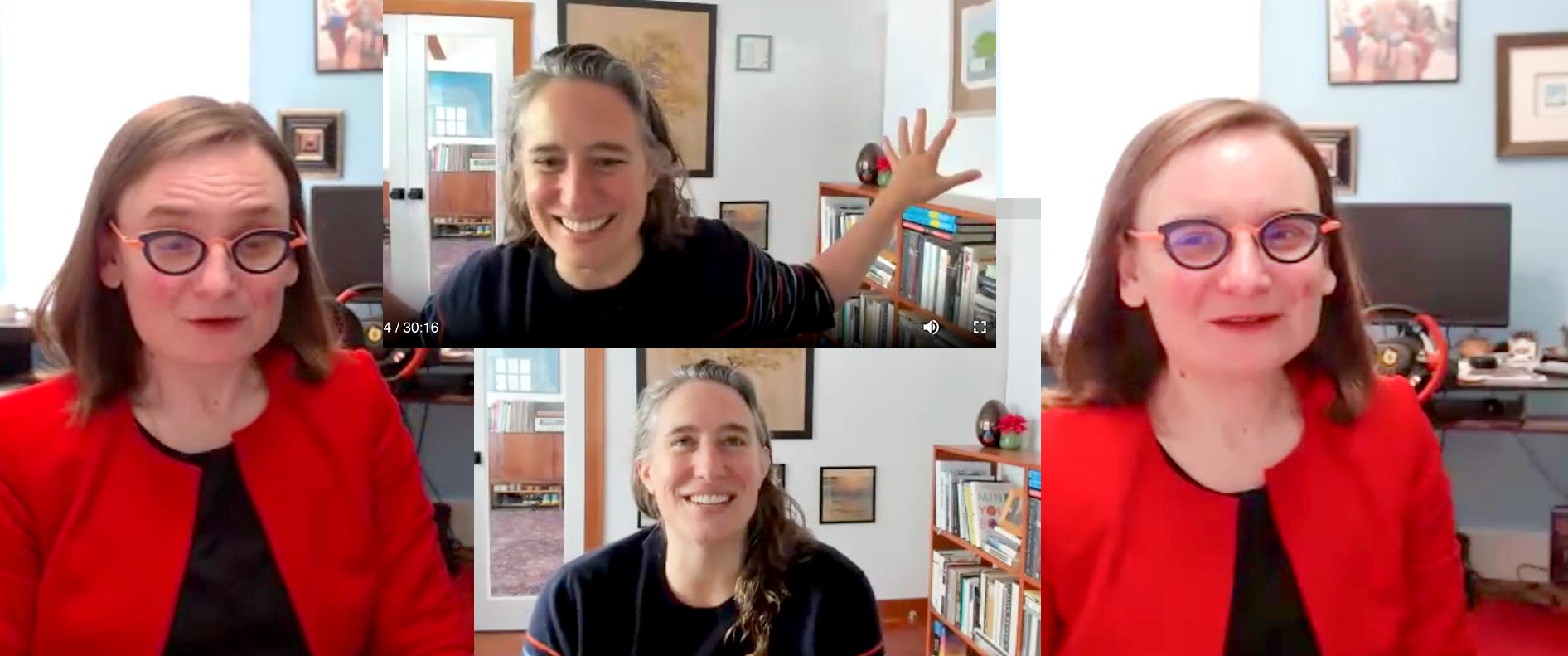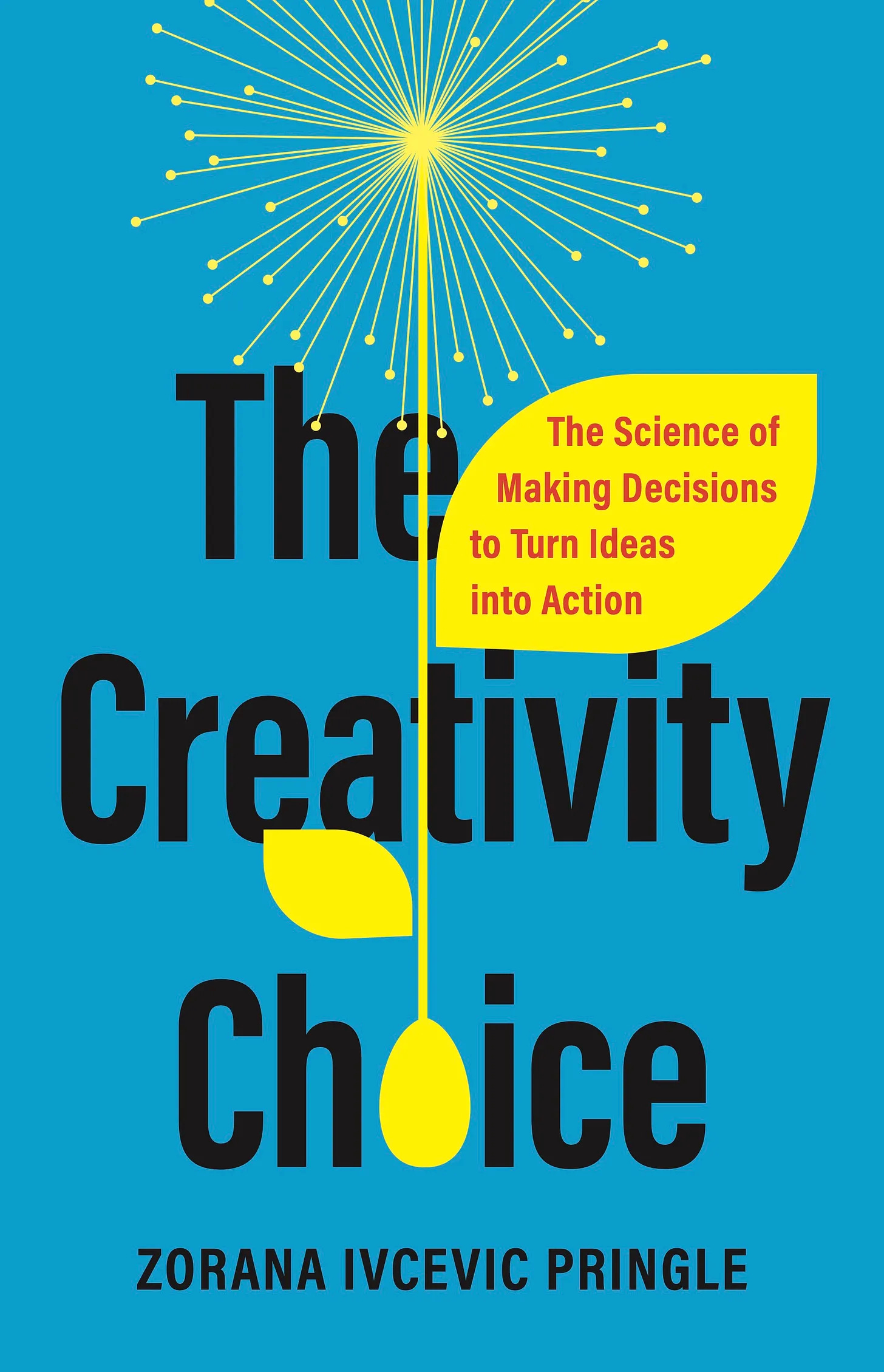Creativity Decision and Beautiful Voyager
Zorana Pringle and Meredith Arthur explore how emotions fuel creativity together
If you’re a longtime reader of Beautiful Voyager, you may already be aware of the work of creativity researcher
since I’ve interviewed her on my podcast before. Or perhaps you’re a reader of her popular Substack, . In honor of the publication of Zorana’s new book, The Creativity Choice, Zorana and I got together again to discuss some of her big picture insights about creativity. Since I appear in her book, we figured we’d start the conversation with a reflection about the writing process.Meredith of Beautiful Voyager: Let's talk about how you went about choosing who you would feature in your book. What made you want to talk to me for your Chapter on Building Creativity at Work?
Zorana of The Creativity Choice: My goal was to have stories from diverse professional backgrounds. So I ended up with a YouTuber who built a popular channel, a scientist turned leader who started a nonprofit and grew it to have national presence, music producer and record label owner, classical composer, an artist/technologist who led a private-public enterprise, a designer who led her own business and then joined a major financial services company, and others. I wanted the message that creativity is not just about the arts to become intuitive for the reader.
When I approached you, we have worked together for some time on the How We Feel app. We had an in person retreat in San Francisco and as I saw the team interact, I recognized it as the just right example to illustrate psychological safety and building climate for creativity and innovation. Such climate makes a difference between being a one hit wonder and building creativity that is sustainable.
Meredith: How did you originally conceive of that chapter and how did it change as you wrote it? What made you choose one story/person/example over another?
Zorana: This chapter could have been a whole book! I knew I needed to talk about psychological safety – an atmosphere of respect and trust that sharing ideas, even critical ones, will not result in retribution. This is the basis on which climate for creativity is built. And I knew I wanted to talk about leadership. Because leaders color our experience of work and set the tone for what is expected and what is accepted in their teams. I had the building blocks, but it proved difficult to cut it down to a chapter length. If I was not close to the deadline, I might have decided to add an extra chapter and focus it completely on leadership. I ended up doing that somewhat in the conclusion that features Ben Silbermann, co-founder of Pinterest. He was very reflective about the creative process and strongly emphasized the social influences on creativity.
Meredith: Do you have advice for people who want to gather interviews for their own writing work? What makes for a helpful interview? What happens when an interview doesn't fit into the message you want to get across in the chapter? How do you navigate that?
Zorana: My suggestion would be to start with friends, colleagues, and people one has worked with. It can be a snowballing process where one interview makes you think of another person. And then there is reaching to colleagues of colleagues and the outer edges of your social network. For instance, I got introduced to one of the people featured in the book by a podcast host who I collaborated with. I have interviewed many more people than those who are featured in the book. Those who were not featured were not less creative, but might have had experiences that illustrate only a subset of concepts I covered, for instance. As it is the case with any creative work, not everything works out or is kept in the final product.
I started all interviews by asking people to describe their background and the nature of the work they do. Then, I probed about specific topics in the book. I did not have a plan who would be featured in what chapter ahead of time. That emerged from the interviews themselves. Some topics made particular individuals come alive.
Meredith: Let's talk about creativity for overthinkers, people pleasers, and perfectionists (the people I call "Voyagers" on my Substack and site). Are there special considerations for this group of people when it comes to using creativity in their life?
Zorana: Overthinkers have two big problems – getting started, making that initial choice to act on creative ideas, and deciding when the work is completed. Creative work is fundamentally uncertain and uncertainty is psychologically experienced as risk. If we are doing something new and original, it means we have not done it before and therefore cannot be sure whether we can rise to the occasion. Another kind of risk has to do with how we anticipate work to be received and evaluated by others. This is reputational risk.
Overthinkers also often overthink when their work is approaching completion. Is it really done? What else should I do?
The result of overthinking is self-doubt and worries that leaders or mentors might find our ideas silly or out of line. It helps to get out of one’s head and trust opinion of others who believe in our abilities. Remind yourself that doubts are part of creative work for most people. In other words, you are not uniquely plagued by doubt and it is not diagnostic of your inability to create. It is simply a biproduct of doing something that has not been done before.
Meredith: If you could wave a magic wand and have everyone in the world know one thing about creativity, what would it be?
Zorana: Most fairytales that I read allow for three wishes. So, let’s pretend that my magic wand is fully functional and can grant three creativity lessons.
You do not have to feel fully confident you can do something creative. Creative confidence is built through action. You need just enough sense that you might be able to do it to take the first step. As you make progress, your confidence will grow.
First ideas are rarely (really, just about never) the best. Creativity is hard for everyone and takes persistence.
Learn how different emotions relate to thinking and use that to your advantage. When feeling down, work on tasks that require critical thinking; these moods make it possible to see all that is a problem. When feeling upbeat, play with new ideas.
Meredith: Why is this work important right now? How does it fit into larger contexts that people might be facing?
Zorana: With the rise of AI, technology can do a lot of what humans used to and what used to provide us meaning. I believe that creativity will be a way to preserve human dignity. AI can create avatars in the style of Studio Ghibli. But humans built Studio Ghibli in the first place. And humans recognized its value and asked for those avatars. Creativity is fundamentally about asking questions. Albert Einstein and Leopold Infeld wrote, “The formulation of a problem is often more essential than its solution, which may be merely a matter of mathematical or experimental skill. To raise new questions, new possibilities, to regard old questions from a new angle, requires creative imagination and marks real advance in science.” What they described for science it true of creativity in general. It is built on asking questions. Not once, but many times. And that will remain human only for at least the foreseeable future.
Meredith: What question am I not asking you that I should be?
Zorana: You did not ask about creative blocks. They are real. Remember when you are in the middle of one that the definition of a creative block is a failure to make progress that is not due to lack of ability. Give yourself some slack. Imagine what you would say to a friend who was going through something similar. Would you tell them they should have known better? Like you are probably telling yourself? Chances are not. Kindness to yourself will relieve the feeling of being overwhelmed just enough to be able to start opening your thinking and see new perspectives.






